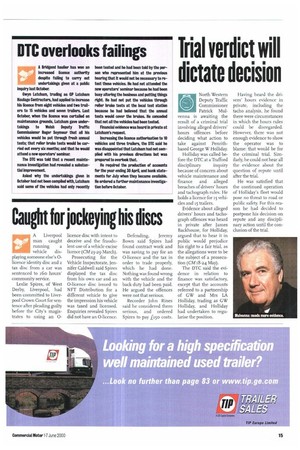Trial verdict will dictate decision
Page 17

If you've noticed an error in this article please click here to report it so we can fix it.
North Western Deputy Traffic Commissioner Patrick Mulvenna is awaiting the result of a criminal trial involving alleged drivers' hours offences before deciding what action to take against Penrithbased George W Holliday.
Holliday was called before the DTC at a Trafford
disciplinary inquiry because of concern about vehicle maintenance and finance and alleged breaches of drivers hours and tachograph rules. He holds a licence for 15 vehides and 15 trailers.
Evidence about alleged drivers' hours and tachograph offences was heard in private after James Backhouse, for Holliday, argued that to hear it in public would prejudice his right to a fair trial, as the allegations were to be the subject of a prosecution (CM18-24 May).
The DTC said the evidence in relation to finance was satisfactory, except that the accounts referred to a partnership of GW and Mrs LA Holliday, trading as GW Holliday, and Holliday had undertaken to regularise the position.
Having heard the drivers' hours evidence in private, including the tacho analysis, he found there were circumstances in which the hours rules could be disregarded. However, there was not enough evidence to show the operator was to blame: that would be for the criminal trial. Similarly, he could not hear all the evidence about the question of repute until after the trial.
He was satisfied that the continued operation of Holliday's fleet would pose no threat to road or public safety. For this reason he had decided to postpone his decision on repute and any disciplinary action until the conclusion of the trial.








































































































